
Nuclear proliferation is the spread of nuclear weapons, fissionable material, and weapons-applicable nuclear technology and information to nations not recognized as "Nuclear Weapon States" by the Treaty on the Non-Proliferation of Nuclear Weapons, commonly known as the Non-Proliferation Treaty or NPT. Proliferation has been opposed by many nations with and without nuclear weapons, as governments fear that more countries with nuclear weapons will increase the possibility of nuclear warfare, de-stabilize international or regional relations, or infringe upon the national sovereignty of nation states.
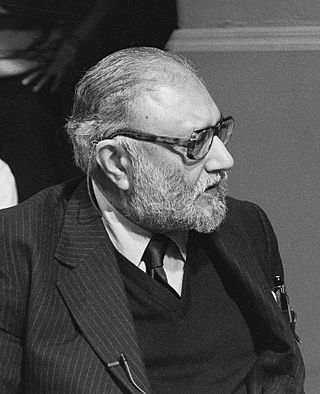
Mohammad Abdus Salam was a Pakistani theoretical physicist. He shared the 1979 Nobel Prize in Physics with Sheldon Glashow and Steven Weinberg for his contribution to the electroweak unification theory. He was the first Pakistani and the first Muslim from an Islamic country to receive a Nobel Prize in science and the second from an Islamic country to receive any Nobel Prize, after Anwar Sadat of Egypt.

Abdul Qadeer Khan,, known as A. Q. Khan, was a Pakistani nuclear physicist and metallurgical engineer who is colloquially known as the "father of Pakistan's atomic weapons program".
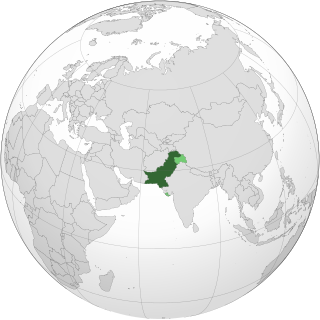
Pakistan is one of nine states that possess nuclear weapons. Pakistan began developing nuclear weapons in January 1972 under Prime Minister Zulfikar Ali Bhutto, who delegated the program to the Chairman of the Pakistan Atomic Energy Commission (PAEC) Munir Ahmad Khan with a commitment to having the device ready by the end of 1976. Since PAEC, which consisted of over twenty laboratories and projects under reactor physicist Munir Ahmad Khan, was falling behind schedule and having considerable difficulty producing fissile material, Abdul Qadeer Khan, a metallurgist working on centrifuge enrichment for Urenco, joined the program at the behest of the Bhutto administration by the end of 1974. Producing fissile material was pivotal to the Kahuta Project's success and thus to Pakistan obtaining the capability to detonate a nuclear weapon by the end of 1984.

Pakistan Atomic Energy Commission (PAEC) is a federally funded independent governmental agency, concerned with research and development of nuclear power, promotion of nuclear science, energy conservation and the peaceful usage of nuclear technology.

Dr. Samar Mubarakmand is a Pakistani nuclear physicist known for his research in gamma spectroscopy and experimental development of the linear accelerator.

The Pakistan Institute of Nuclear Science & Technology (PINSTECH) is a federally funded research and development laboratory in Nilore, Islamabad, Pakistan.

Ishfaq Ahmad KhanSI, HI, NI, FPAS, was a Pakistani nuclear physicist, emeritus professor of high-energy physics at the National Centre for Physics, and former science advisor to the Government of Pakistan.
In Pakistan, nuclear power is provided by six commercial nuclear power plants with a net capacity of 3,262 megawatts (3.262 GW) from pressurized water reactors. In 2020, Pakistan's nuclear power plants produced a total of 133 terawatt-hours of electricity, which accounted for roughly 10% of the nation's total electric energy generation.
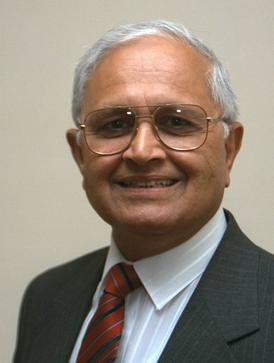
Munir Ahmad Khan, NI, HI, FPAS, was a Pakistani nuclear reactor physicist who is credited, among others, with being the "father of the atomic bomb program" of Pakistan for their leading role in developing their nation's nuclear weapons during the successive years after the war with India in 1971.

Riazuddin, also spelled as Riaz-Ud-Din, was a Pakistani theoretical physicist, specialising in high-energy physics and nuclear physics. Starting his scientific research in physics in 1958, Riazuddin was considered one of the early pioneers of Pakistan's nuclear weapons development and atomic deterrence development. He was the director of the Theoretical Physics Group (TPG) of the Pakistan Atomic Energy Commission (PAEC) from 1974 until 1984. Riazuddin was a pupil of the winner of the 1979 Nobel Prize in Physics, Abdus Salam.
Muhammad Hafeez Qureshi, NI, SI, HI, known as Hafeez Qureshi, was a Pakistani nuclear scientist and a mechanical engineer, known for his role as a diagnostics engineer for his nation's nuclear capability.
Chaudhry Abdul Majeed was a Pakistani nuclear chemist, nuclear weapon and reactor expert. He is known as one of the pioneers of Pakistan's nuclear weapon programme, and has worked closely with former Pakistan Atomic Energy Commission (PAEC) Chairman Munir Ahmad Khan's plutonium reprocessing project. He rose to prominence when he was apprehended by Pakistan's intelligence agencies in a joint operation in late October 2001. Majeed was also one of the founding members of Sultan Bashiruddin Mahmood's Ummah Tameer-e-Nau organisation; an NGO which caused an international embarrassment for Pakistan.
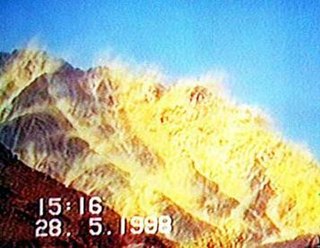
Project-706, also known as Project-786 was the codename of a research and development program to develop Pakistan's first nuclear weapons. The program was initiated by Prime Minister Zulfiqar Ali Bhutto in 1974 in response to the Indian nuclear tests conducted in May 1974. During the course of this program, Pakistani nuclear scientists and engineers developed the requisite nuclear infrastructure and gained expertise in the extraction, refining, processing and handling of fissile material with the ultimate goal of designing a nuclear device. These objectives were achieved by the early 1980s with the first successful cold test of a Pakistani nuclear device in 1983. The two institutions responsible for the execution of the program were the Pakistan Atomic Energy Commission and the Kahuta Research Laboratories, led by Munir Ahmed Khan and Abdul Qadeer Khan respectively. In 1976 an organization called Special Development Works (SDW) was created within the Pakistan Army, directly under the Chief of the Army Staff (Pakistan) (COAS). This organization worked closely with PAEC and KRL to secretly prepare the nuclear test sites in Baluchistan and other required civil infrastructure.

The Pakistan Atomic Research Reactor or (PARR) are two nuclear research reactors and two other experimental neutron sources located in the PINSTECH Laboratory, Nilore, Islamabad, Pakistan.
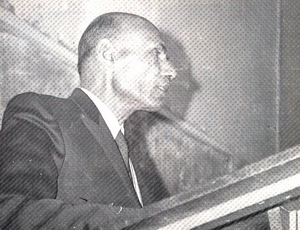
Rafi Muhammad Chaudhry FPAS HI, NI, SI, Skdt best known as R. M. Chaudhry, was a Pakistani nuclear physicist and a professor of particle physics at the Government College University. His teaching and instructions on modern physics influenced many of his student to pursue career in physics who regard him as one of the key architects of having been the pioneer of experimental nuclear physics research in Pakistan and, along with Abdus Salam and Ishrat Hussain Usmani, one of the main creators of Pakistan's nuclear weapons research program in the 1970s. Chaudhry, who served as professor of nuclear physics at Government College University, was later referred to by Dr. Samar Mubarakmand, one of his students, as "the true father of the nuclear weapons program of Pakistan".
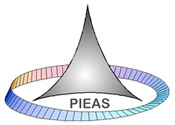
The Pakistan Institute of Engineering and Applied Sciences (PIEAS), is a public research university located in Islamabad, Pakistan. The university is modelled on international standards with a strong focus on the scientific advancement of the nuclear science-related STEM fields.
Naeem Ahmad Khan, FPAS, was a Pakistani nuclear physicist and a professor of physics who was known for his work in developing techniques using the solid-state nuclear track detector and solid-state nuclear magnetic resonance. Although he worked with the Government of Pakistan for most of his career, he also taught physics at a number of Pakistani universities and was the civilian scientist of the Pakistan Air Force (PAF) until his death.

Ghulam Dastagir Alam Qasmi, was a Pakistani theoretical physicist and professor of mathematics at the Quaid-e-Azam University. Alam is best known for conceiving and embarking on research on the gas centrifuge during Pakistan's integrated atomic bomb project in the 1970s, and he also conceived the research on charge density, nuclear fission, and gamma-ray bursts throughout his career.
Iqbal Hussain Qureshi 27 September 1937 – 8 December 2012) SI, FPAS, best known as I.H. Qureshi, was a Pakistani nuclear chemist and an Emeritus professor of chemistry at the University of Karachi. Qureshi was the principal contributor of scientific understanding of various chemical elements: bismuth, cobalt, strontium, thallium, tritium, iron, rubidium, and zinc.















